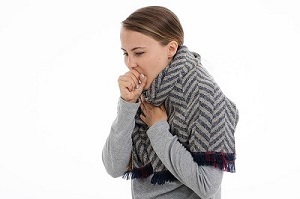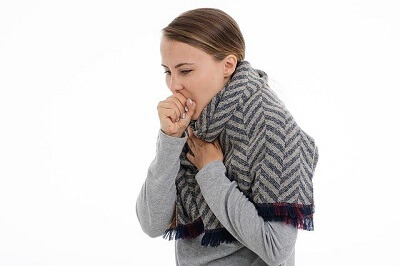When someone coughs, you may want to say something in response. Most cultures have common expressions of care which can be used in this situation. You do not always have to say something when someone coughs.
If they only cough for a few seconds, you can just leave them alone. Otherwise, you could respond by asking about their comfort or if they have a need you could help with, such as “Are you okay? Do you want me to get a glass of water?”.

The aim is simply to demonstrate compassion at a time when someone else may be struggling to breathe.
You could also say:
“Are you feeling well?”
“Are you alright?”
All of these statements express concern for the individual. If the person is not okay, it allows them to respond in the negative by shaking their head or waving their hand. This can be useful if they are choking and are otherwise unable to express their needs.
Sometimes the person who is coughing may be an older individual or may have other physical differences that may delay their recovery from a fit of coughing. If they do not seem to know what they need or appear disoriented, you could ask about things that might help them.
For example, you could ask:
“Do you need a glass of water?”
“Would you like something to drink?”
“Would you like to sit down?”
Be prepared to respond if a person is having a serious medical problem. You can call for assistance on the phone or, if you are trained to offer first aid, you can do so. Sometimes another individual may just need a glass of water. They will feel better after that.
Responding to Coughs in a Virtual Setting
Someone may cough when they are in a phone conversation with you. Someone may also cough during a web conference or another type of online discussion. In this scenario, you would want to respond almost exactly as you would if you were physical with them, except for offering a glass of water or the like of course.
Be prepared to call emergency help to their location if the person is choking and no one else is there. You could call emergency health services in their area, call their neighbor if you have their number, or call the number of another person who might be in the same building but in a different room.
Responding to Persistent Coughing
Someone who is coughing persistently may be doing so for several reasons. They could be ill or they could be reacting to an allergen in their environment. Sometimes a person was not coughing before you entered the room but they’ve started in response to your cologne. The residual scent of tobacco smoke can also trigger coughing in several individuals.
You could say:
“I notice that you’ve been coughing on and off for the past five minutes.”
“It seems like something around you may be causing you to cough.”
“You may need to drink a little water.”
Initiating a discussion in that manner can help the person to identify something that could be triggering their coughing.
For example, if someone nearby opened a bag of laundry soap or a harsh disinfectant, a location change could reduce the coughing. Similarly, a harsh fragrance that’s blowing through an open window can be blocked by closing the window.
Protecting Yourself
Some serious illnesses can be spread by coughing or sneezing. In some cases, it is prudent to shift your location and practice physical distancing, if someone seems to be coughing for ten minutes or more. You may also need to call for medical assistance if they display other signs of illness, such as difficulty breathing.
People who are coughing should cover their mouths to prevent the spread of viruses, such as those that can cause influenza. The correct way to do this is by coughing into the inside of their shirt or blouse or by coughing into a napkin.
Some people may also cough into their palm or fist and then wash their hands immediately after. They may also sanitize their hands with a hand sanitizer on location if soap and water are not available.
While most adults should be aware of the proper method of coughing, there are times when a person may neglect established protocols.
For example, they may cough without covering their mouth with a napkin. In this case, you may cautiously suggest that they cover their mouth or use a handkerchief to contain their cough.
You could say:
“Would you like a tissue?”
“Here you go.” (While handing them a tissue.)
“You know, I have a low immune system. Could you cover your mouth?”
“Please cover your mouth, thank you.”
It is important to keep your body out of close range of the individual if they are coughing without protecting others. It is also important to speak to them as courteously as you can. Agitated, loud, or vigorous talking can spread viruses efficiently and can be almost as bad as coughing.
Coughing in the Workplace
If you notice that an employee has been coughing persistently, your concern for them should lead you to suggest that they take a sick day.
Also, if you suspect that they might have a highly contagious illness, it is in the best interests of your entire team if they stay home until they get better.
After all, it is better for them to miss work for a time, than for your whole department to be out. It is also possible that they could have a dangerous illness, in which case it may be government policy for them to go into quarantine.
In this case, it is up to you to talk to them and let them know that they should go into quarantine if they have not already discussed it.
You could say:
“I notice that you’re showing flu-like symptoms. Have you been tested?”
“You seem to be coughing a lot. You should take a few days and get tested.”
“You’re entitled to sick leave. Please consider using it.“
Coughing in Open Spaces
People need to get fresh air and they often do so by going to parks or going for long walks. While walking in your community you may notice that a stranger passing close to you might begin to cough vigorously.
When someone starts coughing heavily, there’s a possibility that they could spread a virus in the droplets they expel. Since you’re in an open space, you are free to move for your welfare. You should respond immediately if you notice that it’s not a gentle cough, such as that caused by perfume or another irritant.
The tactic that several health experts recommend is that you exhale, look away, and walk away. You’re not required to stay close to them and offer support. If you want to ask how they are doing, you can share your concern from eight feet or more away.
Coughing in Enclosed Spaces
If you’re with family or friends in an enclosed space, you may already be sure of their health status. That means you may only want to ask if they need something to drink, like water. You could also ask how they are feeling.
If you’re not sure whether they are ill and they seem to be coughing consistently, check for other symptoms. If you notice that they have a fever or another symptom that concerns you, discuss self-quarantining with them.
You could say:
“Do you think you should stay in one room for a while?”
“Do you think this is more than a casual cough?”
“We don’t want to spread this if you are sick.”
If you’re at home or by a friend’s home, it’s fairly easy to say this to someone who is coughing. Encouraging a loved one to seek help and protect your unit is best for all concerned.
If you’re on a train or another enclosed space with strangers, you may weigh your options. If the coughing seems to present a level of danger, try to get off at the next stop. If a person seems receptive, you could also offer them a tissue or a mask before you depart.
Children and Coughing
Children in your community, who know you and respond to your guidance, can be taught coughing etiquette if they’re not displaying it.
Remind them to cover their mouth with a tissue. Say that they should wash or sanitize their hands.
In your own home, children who are coughing may become worried or be uncomfortable. For example, they may be suffering from pain in their chest.
It’s important to give reassurance that they will get better, using a positive tone as you speak. Talk with them about whatever their doctor has said, giving age-appropriate information.

Sophie Hammond is a journalist, psychologist, and freelance speechwriter for people in politics and business. She lives on the edge of the Rocky Mountains with her dog and a lifetime supply of books. When she’s not writing, she can be found wandering through nature or journaling at a coffee shop.

